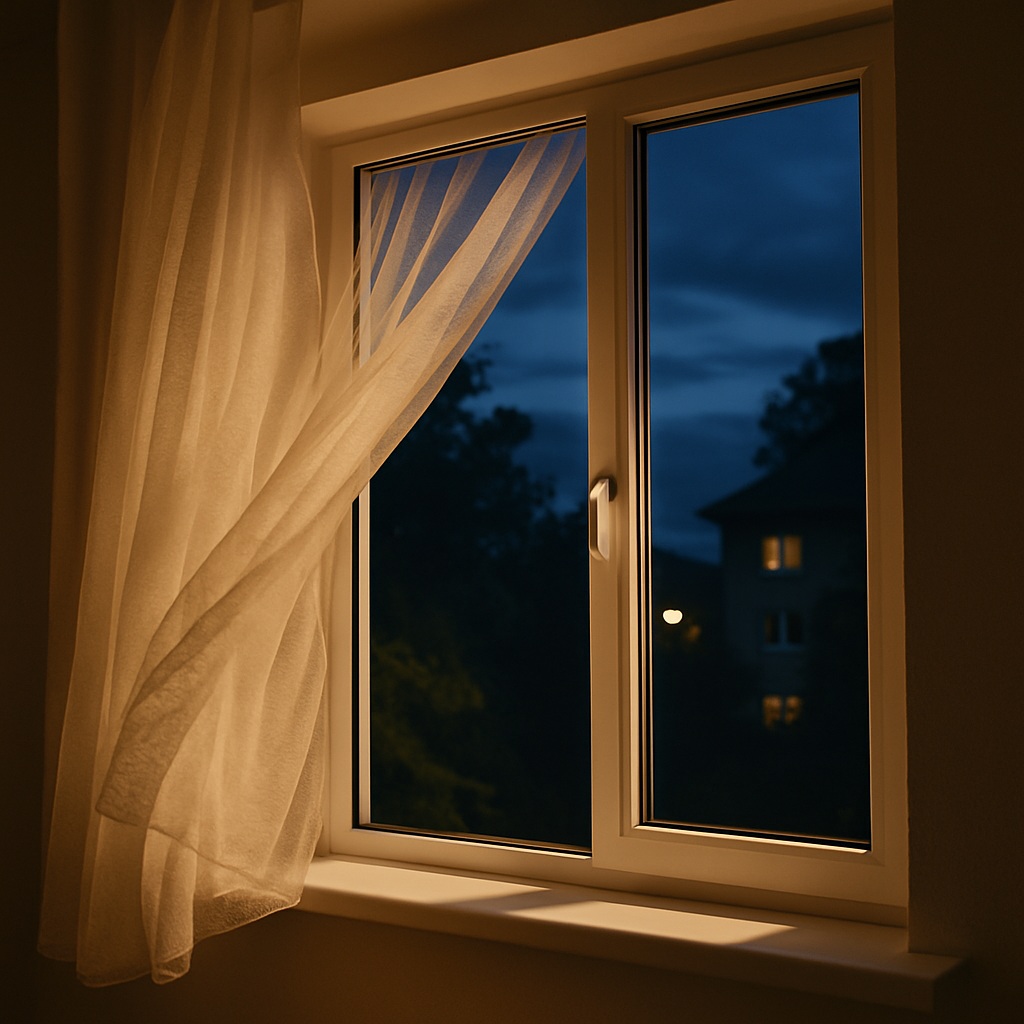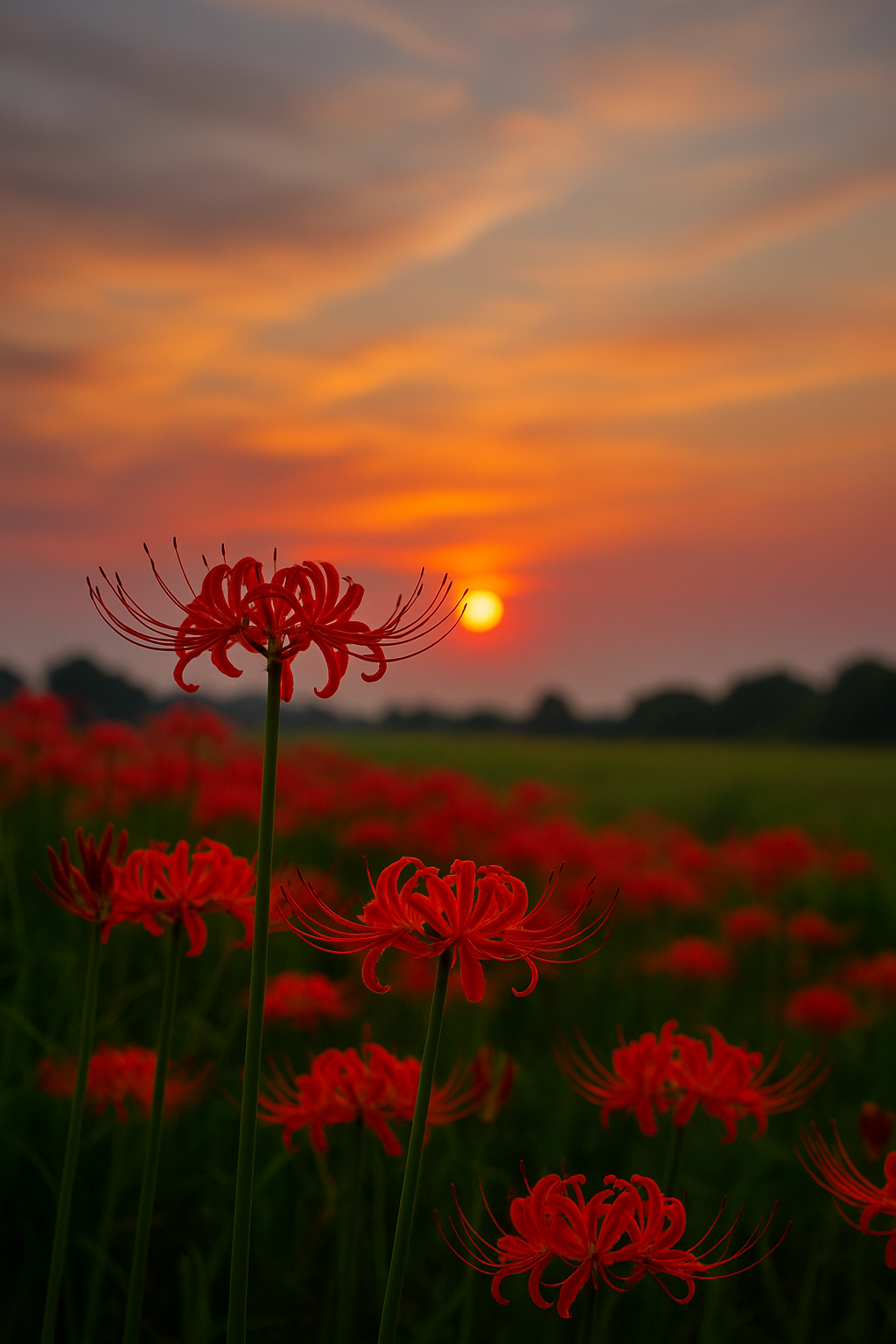昨日、今日と猛暑日が続いていましたが、今夜は空気ががらりと変わった。窓を開けると、冷たい風が吹き込んできて、日中の灼熱を思うとまるで別世界のようだ。涼しいというよりも、むしろ少し寒いくらい。温度計を見ると24℃。数字だけ見れば快適な気温のはずなのに、ずっと30℃を超えるのが当たり前だった体には、妙に肌寒く感じてしまう。人間の体は慣れに支配されるのだと改めて思う。油断してお腹を出して寝てしまえば、あっという間に体調を崩しそうだ。

The moment of opening a window, sensing the subtle shift from summer to autumn.
ちょうど車を運転していたとき、ラジオから「暑さ寒さも彼岸まで」という言葉が流れてきた。いくら異常気象でいつまでも暑さが続くといっても、彼岸を境に空気が変わるのは不思議だ、とパーソナリティが話している。ある大学教授に尋ねたところ、日照時間が短くなる影響だという。なるほど、太陽が出ている時間が短ければ、空気の温もりも自然と減っていくのだと納得した。太陽の動きが、これほど直接的に私たちの気候や体感を左右しているのだと実感する。
思い返せば、真夏の猛暑日でも雲に太陽が隠れると、気温が数度下がっただけでほっとする。逆に冬は、ほんの数分陽が差しただけで、心まで温かくなる。太陽の存在は、数字以上に人間の感覚や気持ちを左右している。考えてみれば、私たちは勝手なものだ。夏には「少しでも隠れてほしい」と願い、冬には「もう少し出てほしい」と思う。まさにご都合主義。しかし、そのメリハリがあるからこそ、四季の移ろいをありがたく感じられるのだろう。
春と秋の短さが取り沙汰されるようになってから、もう10年近く経つ。気候変動の影響なのか、夏と冬が主役を張り、その間の季節はほんのわずかしか残されていない。春の桜が咲いたと思えばすぐに夏がやってきて、秋の紅葉を楽しむ間もなく冬が訪れる。四季の国と呼ばれてきた日本でさえ、今や「二季の国」になりつつあるのではないかと思えてしまう。
だからこそ、私たちは意識的に小さな変化を拾い上げていく必要がある。例えば、窓から吹き込む風の匂い。夏の夜は草や土の湿った香りを含み、秋の夜はそこに少し冷たさが混じる。耳を澄ませば、虫の声もまた季節を告げる。昼間はまだ蝉が鳴いていても、夜には秋の虫たちがその存在を知らせてくれる。視覚、嗅覚、聴覚、それぞれの感覚を研ぎ澄ませば、暦よりも早く季節を感じ取れるのだ。
季節を知らせる小さなサインには、昔から人々の知恵が込められてきた。「暑さ寒さも彼岸まで」という言葉も、自然とともに暮らしてきた日本人が経験から導き出した実感の結晶だ。子どもの頃、祖父母からよく聞かされた言葉でもある。学校や遊びで「まだ暑い、まだ寒い」と文句を言う私に、「もうすぐ彼岸だから大丈夫だよ」と笑いながら言ってくれた。その声を思い出すと、単なる気候の目安以上に、人を励ます優しい響きを持つ言葉だと気づく。
今の時代、気候は大きく変わり、昔ほど単純に「彼岸まで」とはいえなくなっているかもしれない。それでも、季節の区切りを意識することで、私たちは心に節目を持つことができる。自然のリズムに合わせて、自分自身をリセットする機会を与えられるのだ。猛暑で疲れ切った体も、秋の涼しさに触れることで少しずつ落ち着きを取り戻す。彼岸を境に気候が変わるように、私たちもまた心を整えるきっかけを得られるのかもしれない。
私はこの夜、窓から吹き込む冷たい風を受けながら、そんなことを思った。昼間はまだ真夏のように暑いのに、夜はすでに秋の気配を漂わせている。そのコントラストに身を任せると、過ぎ去る夏の記憶と、これから迎える秋の予感が交差する。移ろいゆく季節の中で、私たちは確かに「いま」という時間を生きているのだと実感する。
そして、四季の移ろいを繊細に感じ取ることこそが、日本人の感性を豊かにしてきたのではないだろうか。写真を撮るときも、サックスを吹くときも、ふとした季節の変化に心を揺さぶられる瞬間がある。光の柔らかさや風の冷たさが、表現する音や視点に影響を与えている。自然とともに生きることは、表現者としての私自身を育てることでもあるのだ。
「暑さ寒さも彼岸まで」。
この言葉を改めて思い返す夜、私は季節のありがたさを噛みしめていた。異常気象に揺さぶられる現代だからこそ、昔からの言葉に耳を傾け、小さな変化を大切にしたい。彼岸を境に変わる空気のように、私たちの心もまた少し軽くなる。その感覚を忘れずに、これから訪れる秋を迎えたいと思う。
🔗あわせて読みたい記事
- [暮れる空に、夏の名残を探す]
夕暮れに季節の移ろいを感じたエッセイです。 - [虫の声に気づく夜 — 夏の終わりに]
夏の終わりを知らせる小さな声に耳を澄ませた文章です。
Beyond Heat and Cold — Reflections at the Equinox
Yesterday and today were both scorching hot days, yet tonight the air feels entirely different. When I opened the window, a cool breeze swept in, making me wonder if summer had really loosened its grip. Rather than refreshing, it felt almost cold. The thermometer read 24°C—by any measure a comfortable temperature, but to a body accustomed to living above 30°C every day, it felt oddly chilly. It reminded me just how quickly the human body adapts. Fall asleep with your stomach uncovered tonight, and you’ll likely wake up with a cold.

While driving earlier, I heard a radio program discussing the old saying: “Heat and cold last only until the equinox.” No matter how unusual the weather may be, the announcer noted, the air always seems to shift around this time of year. A professor explained that it’s because the hours of daylight shorten after the equinox. That made sense—less sunlight naturally means less warmth. It struck me how directly the sun’s presence dictates not only the temperature but also how we feel and move through the world.
Even in midsummer, when the sun hides behind clouds, the temperature drops a few degrees and relief washes over us. In winter, a few minutes of sunshine can change the entire mood of the day. The sun’s presence is far more powerful than numbers on a thermometer. And yet, we humans are selfish: in summer we hope for shade, in winter we crave the sun. Perhaps that very contrast is what makes us appreciate the flow of the seasons.
For the past decade, many have said spring and autumn are shrinking. Climate change seems to have stretched summer and winter, leaving only the briefest transitions in between. Cherry blossoms bloom and almost immediately summer heat arrives; autumn leaves barely start to turn before winter sets in. Japan, once known as the “land of four seasons,” now feels as though it is becoming a country of two.
That is why we must pay attention to subtle signs. The scent of the wind that drifts through an open window—humid with soil in summer, crisp and cool in autumn. The chorus of insects that fades as the nights grow colder. If we sharpen our senses, nature will whisper the changing of the seasons long before the calendar does.
These small signs are woven into the wisdom of the past. The phrase “heat and cold last only until the equinox” is not just meteorological observation but a kind of comfort passed down through generations. I remember my grandparents saying it to me as a child: “Don’t worry, the equinox is coming soon.” It was more than a weather forecast; it was reassurance, a gentle reminder that every hardship has an end.
Of course, in today’s world of climate extremes, things are not as simple as they once were. And yet, marking the equinox as a turning point gives us a way to reset ourselves. Just as the atmosphere cools and shifts, we too can take the opportunity to ease our pace and find balance again.
That night, as the cool wind swept through my room, I realized how summer’s intensity and autumn’s promise were crossing paths. The contrast itself made me aware of the present moment, of truly living in now. Perhaps this sensitivity to the subtleties of nature is what has shaped the Japanese sense of beauty and expression. When I take photos or play the saxophone, the changing light or the feel of the wind often influences the way I see or the sound I create. Living in harmony with nature nurtures me as both a person and a creator.
“Heat and cold last only until the equinox.”
As I recalled this phrase, I felt gratitude for the rhythm of the seasons. In a world shaken by climate change, it feels more important than ever to treasure these small shifts. Just as the air lightens around the equinox, so too can our hearts. Holding onto that awareness, I want to welcome the coming autumn with an open mind.
🔗Related Articles
• [Searching for Summer’s Remnants in the Twilight Sky]
An essay about noticing seasonal change in the early twilight.
• [Noticing the Insects’ Chorus — At Summer’s End]
A reflection on listening to insects that quietly announce summer’s close.




コメント